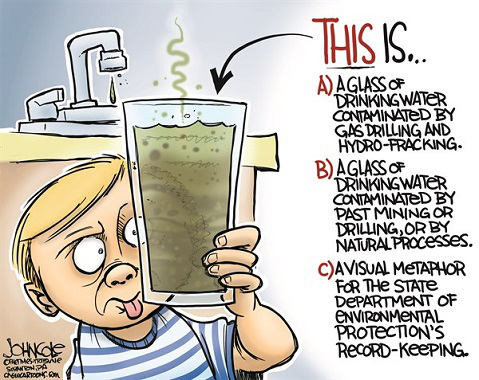Farmers Fear Oil and Water Do Mix
Contamination Worries Fuel New Ballot Measure

Recently, applications to drill thousands of new oil wells in Santa Barbara County are being turned in at record rates (7,700 by just one company). These wells will be used to go after heavy crude using extreme techniques that pose a risk to residents and other businesses. We can get an idea of what the future might hold by looking at our neighbor Kern County where thousands of pump jacks dot the landscape and farmers are suing oil companies for contaminating their irrigation water and in some cases even killing their crops.
Many local farmers face the same risk. Oil and water do mix, and they do so in vast quantities underground. Kern oilfields are a preview of the future of oil worldwide. The industry is moving further into the realm of “unconventional” methods, including tar sands and shale oil. Such heavy oil requires the use and disposal of huge amounts of water. And the consequences will be strewn across the local landscape.
Local techniques include fracking, acidizing, and steam injection. All three involve toxic and often secret chemical mixes and also vast amounts of energy and water. With steam injection, for example, the thick oil must be heated to over 500 degrees to melt it enough to extract. You can imagine the amount of energy and water it takes to essentially heat the ground, thousands of feet down, with steam. The greenhouse gas emissions alone from the proposed wells would be equal to around one million cars on the road.
Farmers all over the world are finding they have to deal with global warming in different ways. For example some orchards are being replanted to trees requiring different chill hours as the warmer weather moves to higher elevations and further north. Insect pests are also able to move into new areas since they can survive the winters now. This comes at a big expense. Of course the obviously more erratic weather with more droughts and intense rain events also cause problems that may be manageable now, but if the trend continues, which scientists think it will, global food production will decrease.
Since the 1960s when steaming started, California oil companies have pumped more than 2.8 trillion gallons of fresh water into the ground — an annual average large enough to supply a city of one million people. Some of that water is the industry’s own recycled wastewater, and some is bought from irrigation districts, but it’s mostly water that could be used for something else. It takes up to eight barrels of water to get a barrel of oil this way. Oil companies with deep pockets are able to outbid framers and cities for water.
As the local oil industry uses a lot of irrigation water, it generates an even larger outflow of contaminated “produced water,” stuff that has poisoned crops over in Kern. This includes some water that returns to the surface after it’s been injected into the ground, and sometimes now-contaminated groundwater that comes up. Recent studies show that a significant amount of radioactivity is also coming up with water from deep in the ground. Many small, poor agricultural towns in Kern County have been forced to tap their ground water, which is often polluted with both agricultural and oil-related pollutants.
The recent ballot initiative to ban these methods is the way to avoid this future here in Santa Barbara County. It’s not worth the gamble for some short-term dollars to endanger our farming and tourist industries or the potential of other clean industries moving here. This ban initiative does not ban conventional oil production, just extreme methods.
Helmut Klauer has been farming in the area for 43 years and currently farms near Buellton. He is the owner of Classic Organic Farm and Market.



